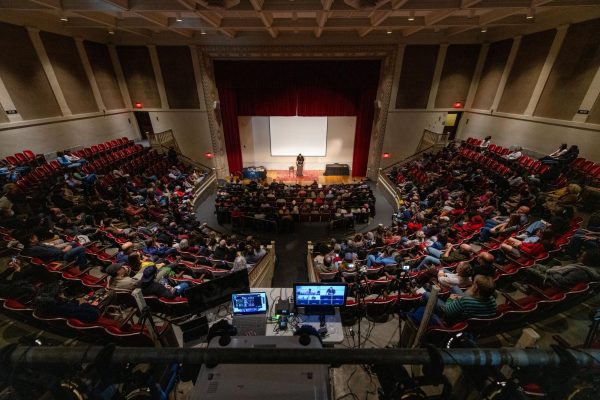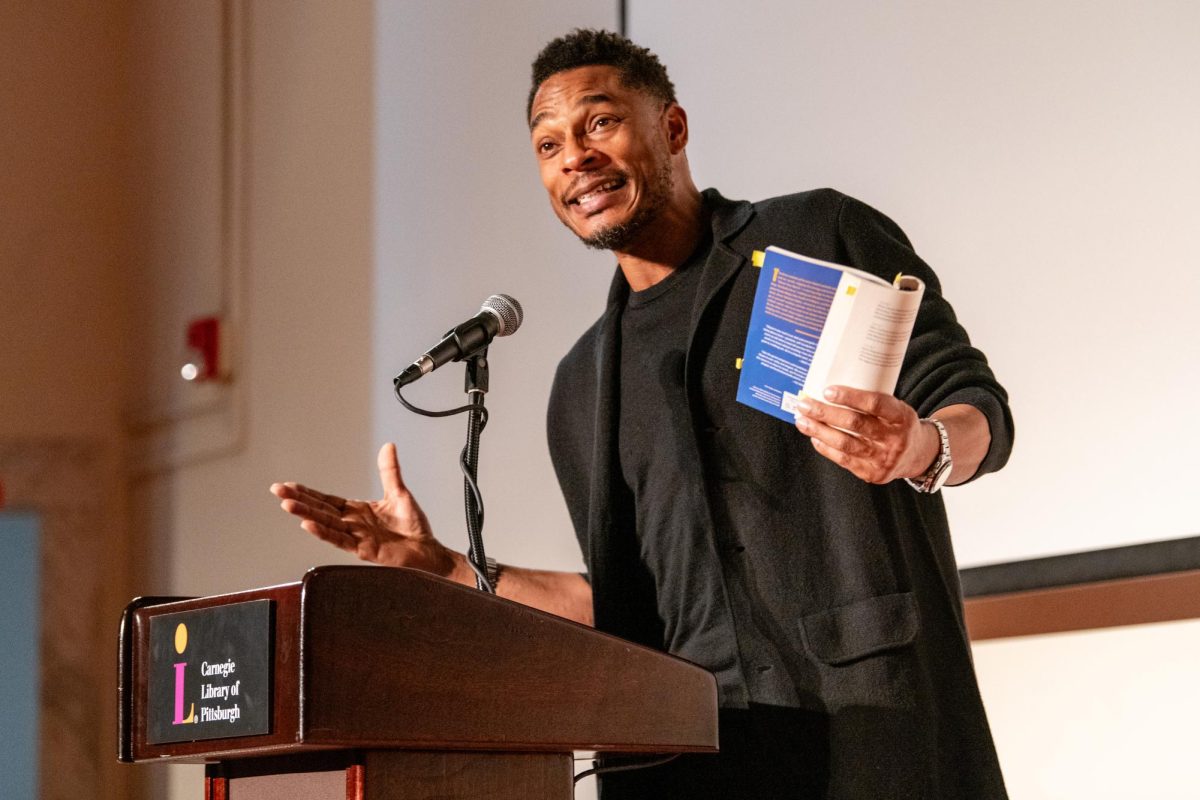From growing up in South Carolina to living in Pittsburgh, poet Terrance Hayes has used poetry to appreciate the world around him for many years.
“Relying on a certain kind of color in conversation gives a little bit of a frame, a little bit of shape, and that’s what poems do,” Hayes said. “They give a little bit of shape for the language.”
Currently a professor of English at New York University, Hayes returned to Pittsburgh for a talk Saturday afternoon at the Carnegie Lecture Hall, where he read selected works and discussed his creative process. Earning his master’s at Pitt in 1997 and later teaching poetry at both Pitt and CMU, Hayes is the author of seven published poetry collections, including the recently released volumes “Watch Your Language” and “So to Speak.”
During his talk, sponsored by the Carnegie Library of Pittsburgh in honor of Black History Month, Hayes said he relies on poetry to express his feelings about life.
“I just write what comes, you know, I try to write every day,” Hayes said. “And it’s all over the place, and I’m fine with that.”
Hayes read aloud one of his poems titled “George Floyd” during the talk, a piece he wrote in 2020 immediately after witnessing an early protest over the death of Floyd. The New Yorker published the poem in June of that year.
“It was the very first protest, right in Washington Square Park, and I could hear it from my window,” Hayes said. “And so in that instance, I went out, I stood with everybody and came back and wrote that poem.”

Hayes said words take on different meanings when used as certain parts of speech, especially when discussing race.
“I feel like Black is a great adjective, but it’s not a noun,” Hayes said. “I associate all adjectives as resources to elaborate whatever my noun is, if that makes sense.”
Bonnie Adelson of Shadyside attended the presentation. She said she appreciated Hayes’ understanding of family dynamics, a theme that is often reflected in his work.
“I came because I used to write poetry and I like to read it,” Adelson said. “I liked how [Hayes] connected a lot of things to family, making seemingly confusing things make all the sense in the world.”
Hayes applies lessons he learned from his family as a child to explain more complex topics in his work.
“Struggles with power dynamics and how one heals, how you think of your wounds and how you think of empathy … that’s all family stuff to me,” Hayes said. “That all comes from the household.”
Even as Hayes has found success with his poetry, he sees past hardships as invaluable assets for depth in his writing.
“If you have been raised by wounded people, they are going to wound you in their love,” Hayes said. “So how do you reconcile with that… this is all in poetry.”
Hayes said that while revising is a necessary part of the writing process, it can be applied beyond prose to how one thinks about life.
“Revision is asking you to see yourself and see the world differently,” Hayes said. “It’s a good practice for poems, but it’s also good for everybody in life as a philosophy.”
Ashleigh Fox of Oakdale, who teaches English at the Community College of Allegheny County, also attended Saturday’s presentation. As a teacher, Fox especially appreciated Hayes’ view on the importance of revisions.
“I really enjoyed when [Hayes] talked about revision as ‘seeing again’ because it’s hard for my students to understand the difference between editing and revising sometimes,” Fox said. “I love his idea of revising as seeing something again for a completely fresh look.”
Hayes said his poems are also important for personal introspection, as they give him a chance to share who he is as a person with the reader.
“In the poems you hear some of the things I think about,” Hayes said. “But I do find myself saying things that I would maybe think of as a personal revelation inside of a poem.”
Repeatedly emphasizing the idea of vulnerability, Hayes said he finds it important to reflect on his writing rather than feeling obligated to continually produce high-quality work.
“It’s important to allow that silence to be part of the work, part of the vulnerability,” Hayes said.
Despite his years of experience in the genre, Hayes said he still finds endless creative opportunities in poetry. He said his writing does not follow a specific structure, as he finds that limiting to the creative process.
“I would never say I have one way of writing poems or reading poems or responding to poems,” Hayes said. “I try to be as open as possible to the whole poetic process.”
Audience members appeared to enjoy the presentation, laughing throughout and giving Hayes a standing ovation at the talk’s conclusion.
“I found myself smiling through most of it,” Adelson said.
Hayes reminded the audience that in any creative endeavor, sharing one’s personal discoveries can greatly affect others.
“Generally, my attitude to the creative process is to just be open and wait to be surprised,” Hayes said. “Then I try to give it some shape, and I give it back to the people.”


